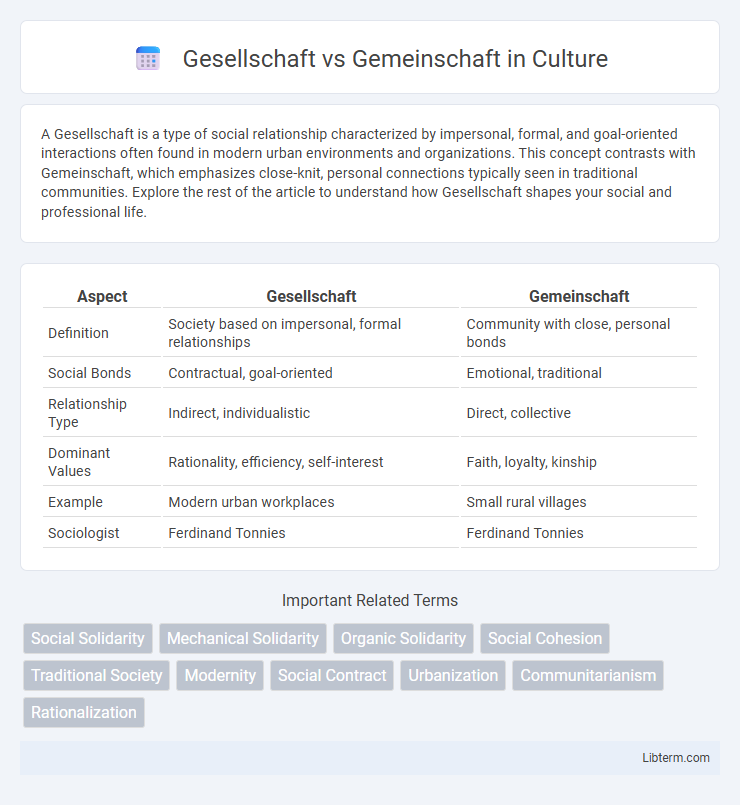A Gesellschaft is a type of social relationship characterized by impersonal, formal, and goal-oriented interactions often found in modern urban environments and organizations. This concept contrasts with Gemeinschaft, which emphasizes close-knit, personal connections typically seen in traditional communities. Explore the rest of the article to understand how Gesellschaft shapes your social and professional life.
Table of Comparison
| Aspect | Gesellschaft | Gemeinschaft |
|---|---|---|
| Definition | Society based on impersonal, formal relationships | Community with close, personal bonds |
| Social Bonds | Contractual, goal-oriented | Emotional, traditional |
| Relationship Type | Indirect, individualistic | Direct, collective |
| Dominant Values | Rationality, efficiency, self-interest | Faith, loyalty, kinship |
| Example | Modern urban workplaces | Small rural villages |
| Sociologist | Ferdinand Tonnies | Ferdinand Tonnies |
Defining Gesellschaft and Gemeinschaft
Gesellschaft refers to a modern, impersonal society characterized by formal, contractual relationships and individual self-interest, often found in urban and industrial contexts. Gemeinschaft describes traditional, close-knit communities rooted in shared values, family ties, and collective identity, typical of rural or small-scale societies. These sociological concepts highlight the contrast between social solidarity based on personal bonds versus social organization driven by rational agreements.
Historical Origins of the Concepts
The concepts of Gesellschaft and Gemeinschaft were introduced by German sociologist Ferdinand Tonnies in his 1887 work "Gemeinschaft und Gesellschaft," distinguishing social ties based on historical transformations. Gemeinschaft describes traditional communities characterized by close, personal relationships and shared values, typically found in rural or kinship-based societies. Gesellschaft represents modern, urban, and industrial societies where relationships are impersonal, contractual, and driven by individual self-interest and formal institutions.
Key Differences Between Gesellschaft and Gemeinschaft
Gesellschaft refers to social relations based on impersonal, formal, and contractual associations often found in modern urban societies, while Gemeinschaft describes close-knit, informal, and personal relationships typical of traditional rural communities. Key differences include Gesellschaft's emphasis on individualism, indirect interactions, and goal-driven partnerships contrasted with Gemeinschaft's focus on collective values, direct interactions, and emotional bonds. These distinctions highlight how Gesellschaft supports societal complexity and economic transactions, whereas Gemeinschaft fosters social cohesion and shared cultural norms.
Social Structure: Gemeinschaft vs Gesellschaft
Gemeinschaft characterizes social structure through close-knit, personal relationships typical of traditional, rural communities where social bonds are based on family, friendship, and shared values. Gesellschaft represents modern, urban societies defined by impersonal, formal associations and individual self-interest, often facilitated by bureaucratic institutions and contracts. The fundamental contrast lies in Gemeinschaft's emphasis on collective well-being and Gemeinschaft's reliance on rational, goal-oriented interactions.
Examples in Modern Society
Gesellschaft and Gemeinschaft represent two distinct types of social relationships in modern society, with Gesellschaft characterized by formal, impersonal associations such as corporations, urban communities, and online platforms like LinkedIn. Gemeinschaft, in contrast, exemplifies close-knit, personal relationships found in rural villages, family units, and tight local neighborhoods where social bonds are based on shared values and traditions. The rise of digital communities shows a hybrid model, blending Gesellschaft's broad, goal-oriented structures with Gemeinschaft-like emotional ties and identity.
Impact on Social Relationships
Gesellschaft emphasizes formal, impersonal relationships driven by individual self-interest and economic transactions, leading to social connections based on contracts and roles rather than emotional bonds. Gemeinschaft reflects close-knit, organic social ties grounded in shared values, traditions, and collective identity, fostering strong interpersonal trust and mutual support. The shift from Gemeinschaft to Gesellschaft affects the depth and quality of social relationships, often resulting in increased social fragmentation and weakened community cohesion.
Role in Urbanization and Industrialization
Gesellschaft represents impersonal, contractual relationships typical in urban and industrial societies where social ties are based on individual self-interest and formal institutions. Gemeinschaft reflects close-knit, personal communities often found in rural, pre-industrial settings where social bonds are grounded in tradition and shared values. Urbanization and industrialization accelerate the shift from Gemeinschaft to Gesellschaft by fostering economic specialization, population mobility, and complex organizational structures.
Cultural Implications and Values
Gesellschaft societies emphasize individualism, formal relationships, and economic transactions, creating cultural values centered on personal achievement, autonomy, and contractual social interactions. Gemeinschaft societies prioritize close-knit communities, shared traditions, and emotional bonds, fostering cultural values rooted in loyalty, social cohesion, and collective well-being. The contrast between Gesellschaft and Gemeinschaft highlights evolving social dynamics influencing identity, trust, and communal responsibilities in modern versus traditional contexts.
Contemporary Relevance of Gesellschaft and Gemeinschaft
Gesellschaft, characterized by impersonal and formal social ties, remains highly relevant in contemporary urban societies where individualism and economic interactions dominate daily life. Gemeinschaft continues to play a crucial role in fostering strong community bonds and social support within families and tight-knit groups amid increasing digital connectivity. The interplay between Gesellschaft and Gemeinschaft shapes modern social dynamics, influencing everything from workplace relationships to neighborhood cohesion.
Future Perspectives on Social Organization
Gesellschaft and Gemeinschaft represent contrasting social structures, with Gesellschaft emphasizing impersonal, contractual relationships driven by individual interests, while Gemeinschaft centers on close-knit, community-oriented bonds rooted in shared values. Future perspectives on social organization highlight a hybridization where digital connectivity fosters Gesellschaft-like networks alongside a resurgence of Gemeinschaft-inspired localism and trust-based interactions. Advancements in technology and shifts in societal values suggest evolving models that integrate formal institutions with community-driven support systems to address complex social challenges.
Gesellschaft Infographic

 libterm.com
libterm.com